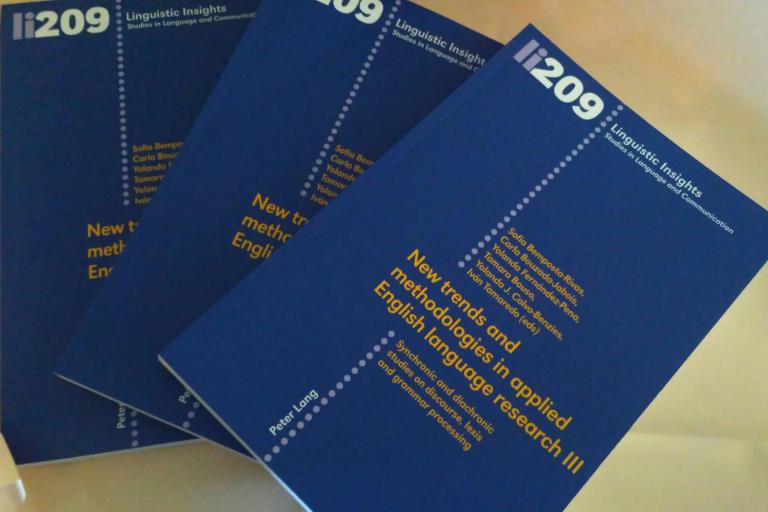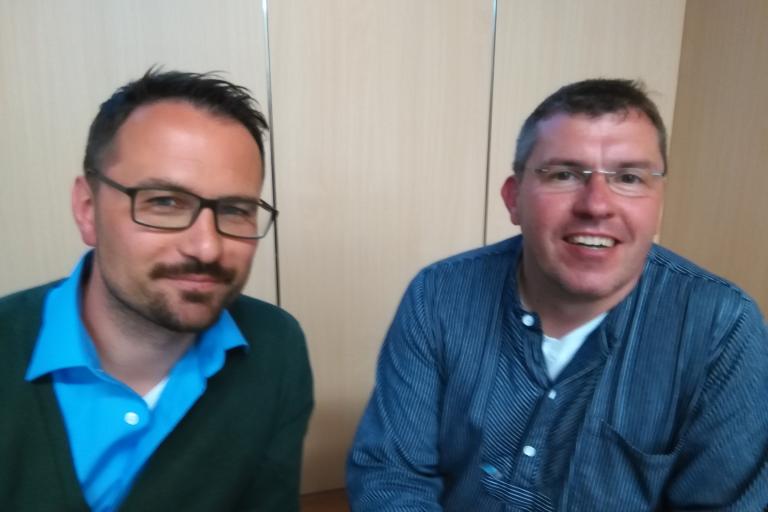As part of the activities of the research project VAR21 Variation in micro-diachrony, Dr Lise Fontaine (Cardiff University) visited our group on 22-24 April, 2019. On Monday 22, Dr Fontaine delivered a short seminar on the English nominal group. She provided a detailed overview of the methodological implications that the description of functional elements such as determiner, head or qualifier have within the so-called Cardiff Grammar (CG) and the Sydney model of Systemic Functional Linguistics. Attention was paid to the notions of phrase and group, as well as to the item of, pervasive in English and yet challenging when it occurs in complex nominal groups. On Tuesday 23, the focus turned towards the notion of Theme and the various approaches to it that the Systemic Functional framework provides.
Dr Lise Fontaine is a Reader at Cardiff University (Wales). She lectures mainly on functional grammar, word meaning, corpus linguistics, and introductory psycholinguistics. Her research interests include functional grammar theory and, more specifically, the study of referring expressions. She is actively involved in a number of networks. The LinC research network is a forum for researchers interested in Systemic Functional Linguistics, and LACRE (the Language and Cognition Research Network) is a forum for researchers interested in using data-driven methods to test hypotheses about language processing. The Nominality and Meaning Directness (NaMeD) project stems from her collaboration with Prof Stella Neumann, RWTH Aachen University, and Prof Miriam Taverniers, Ghent University, and concentrates on a contrastive, quantitative and theoretical approach to the study of meaning in text. The project aims to challenge certain fundamental assumptions concerning what are seen as nominal expressions in relation to other types of meaning expressions (e.g. event, causal, temporal, conjunctive) and in terms of how such meanings can be said to be ‘direct’ or not. As a member of the European COST Action, Strengthening Europeans' capabilities by establishing the European literacy network (ELN), her work on digital writing processes helps to contribute to a better understanding of developmental aspects of literacy and education. She is also a co-founder and member of LLAWEN (Literacy and Language AWareness in EducatioN) a network for academics, classroom teachers and literacy experts who are working together to improve the way teachers can be supported in developing their confidence and competence in delivering the literacy aspects of the Literacy and Numeracy Framework in Wales in both English and Cymraeg (Welsh).
Lise Fontaine is the author of Analysing English Grammar: A systemic-functional introduction (Cambridge University Press, 2012) and co-author of Referring in Language: An integrated approach (Cambridge Univesity Press, in preparation). She has also co-edited the following five volumes: Systemic Functional Linguistics: Exploring Choice (Cambridge University Press, 2013); Choice in Language: Applications in Text Analysis (Equinox, 2013); Perspectives from Systemic Functional Linguistics: An Appliable Theory of Language (Routledge, 2018), The Oxford Companion to the English Language (Oxford University Press, 2018, 2nd ed) and The Cambridge Handbook of Systemic Functional Linguistics (Cambridge University Press, 2019).







